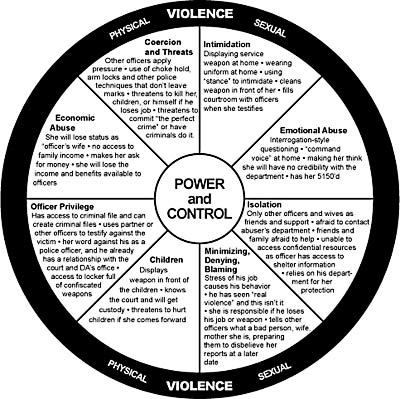If
Your Batterer Is a Cop
Even more
than other battered women, when you decide to leave or prosecute,
you need to move strategically and get good advice from the outset.
Here are some suggestions.
If You're
Not Yet Ready to Leave . . .
- Open a safe deposit box and begin to fill it with the papers you'll need to get out; i.e., passport, children's birth certificates, car registration and insurance papers, and whatever money you can set aside. Don't count on using credit cards – they may be cancelled once you leave.
- Open a bank account in your name only in a bank other than the one where you have any joint accounts. If you do not live in a community property state, any new purchases (cars, appliances, etc.) should be put in your name, not joint.
- Make a safety plan in case you have to flee. Where would you go where the abuser wouldn't look for you? How would you get there? Who would be a contact person you can trust who would know how to reach you? How would you handle your employer? Your children's schools?
- Take, or have a friend take, pictures of your injuries from any incidents of abuse starting now. Having the front page of that day’s newspaper along with your face and at least one of the injuries in the photo will confirm the date they were taken. Otherwise, date the photos, and put with them a written statement, signed by the photographer under penalty of perjury, stating the date and circumstances under which the photos were taken. Put them in your safe deposit box, along with your written account of the incident – date, time, place, witnesses, what happened, injuries, anyone you told, etc.
- Keep any communication from the abuser; notes, cards from flowers sent to win you back after beatings, tapes of phone messages containing threats or rageful behavior. Put them in your safe deposit box.
- Keep a log of all incidents of abuse, whether or not you were injured, including date, what happened, injuries, witnesses, names of those you told about the beating (if anyone), whether police were called and, if so, what officer responded and how they handled the call.
- If you need medical care after a beating, get a copy of the doctor's or hospital report and put it in your safe deposit box. Even if you lied to the medical person about how you were injured, this can be important evidence. Put your account of the incident with the medical report .
WARNING: Some states require medical practitioners to report domestic violence. You should check your state’s law on this as it’s possible your visit may launch a criminal investigation into the violence before you’re ready to report.
- Start making friends and contacts outside the law enforcement community. Many partners of police officers aren't "allowed" to have friends who aren't cop-related, which means you have no support system if you decide to leave. You're going to need that support system, so start now cultivating friendships with co-workers, parents of your children's friends, etc.
Once You Decide to Get Out . . .
If you don't already know it, your danger is greatest when you leave the relationship. That may be even more true when your abuser is a police officer, because they have so many means of retaliation at their disposal. That doesn't mean you should sit back and take it; it just means you need to prepare as much as possible, think things through, and move carefully once you decide to leave.
While the tendency is to do as little as possible, hoping not to further enrage the abuser, in our experience you may be better off to do everything in your power to put a leash on the abuser, and do it all at once.
- Find an advocate who is independent from police agencies, preferably one experienced in working with police officer domestic violence. Your women’s shelter may have an advocate especially trained in police DV. If not, check with your state’s against domestic violence. Also the National Center for Women and Policing may be able to provide contacts in your area.
- Report the violence to the district attorney (if your state has DAs). Some DA’s will accept reports of crimes where police are involved; some won’t. If you can’t get the district attorney to handle the investigation, report to a police department that has jurisdiction, but not the same agency where the abuser works. Alternately, ask your state attorney general to handle the investigation.
- Make an appointment to meet with the prosecutor in charge of the domestic violence unit; if there is no DV unit in your DA’s office, get an appointment with an experienced felony prosecutor. Tell them your abuser is a police officer and that you want to report domestic violence. Tell them you fear for your safety, and that the investigation will be biased if conducted by a police agency.
- Have your advocate present at all interviews with district attorneys or police. Never meet with any law enforcement people alone. Not only do you want a witness present so your words aren’t later misrepresented, you also want someone who can help you ask pertinent questions and remember what was said and done.
- Talk with the prosecutor about how best to report without having everything you report be “discoverable.” (Note that the district attorney has a duty to provide tangible evidence to the defense.)
- Give the district attorney copies of any documentation you have of past violence (photographs, logs, statements, notes or tapes of phone messages from the abuser). Never give anyone your only copy of anything, especially not police or prosecutors.
- Ask to be advised when the officer will be interviewed or arrested so you can make safety plans. As soon as the abuser is advised, get ready for pressure (up to death threats) to drop the charges or not to testify.
- Avoid making multiple statements to police or the prosecution. The more interviews and statements you submit, the more chances for the defense attorney to turn slight differences in wording into "contradictory" statements. Tell law enforcement this in your initial interview, and ask that the interview be all-inclusive and that it be taped.
- Get a restraining order or order of protection. While a restraining order is truly just a piece of paper, it can at least give you a way of getting immediate temporary custody orders for your children. And because your abuser is a police officer who wants to stay on the job, a violation of a court order can be especially costly. If you decide to get a protective order, here are some things to consider:
- Contact your state’s Legal Services Department, as they may have a program that provides for free lawyers experienced in arguing domestic restraining orders. Otherwise, you would be well-advised to hire a lawyer for handle your evidentiary hearing.
- Fight against “mutual” restraining orders. Some judges will want to protect the officer by equally restraining you against contacting or harassing him. An order against you makes it look like you also did something wrong, which can be damaging to you further down the road.
- Fight against “special” protective orders if you fear retaliation. Orders that are not specifically domestic violence orders, or orders with special, negotiated provisions may allow the abuser to keep his guns, putting you at great risk.
- If you feel you can safely stay in your home, ask for a kick-out order (a judicial directive ordering him to leave the house), a police stand-by while the abuser moves out, and temporary custody orders if there are children.
- If you can’t stay in your home safely, get out and get a restraining order for protection. Request that your current address be confidential, and get temporary custody orders in place.
- Include in your restraining order declaration a list of all the guns you're aware the abuser owns. Follow up to make sure all those guns are confiscated when the order is served. (NOTE: Restraining order documents are public record in most states; thus the abuser will be able to see your declaration.)
- Report every violation of the protective order and get a copy of the report generated by your complaint. Keep a log of all the violations, name and badge number of who you reported to, what action was taken, etc.
- Report the violence to Internal Affairs (IA) at the police agency where your abuser works. The question here is whether to cooperate in their investigation. If you’ve made a criminal report, you don’t want to give any new statement to IA until the criminal case is over. If you’ve provided a written statement to the district attorney or investigating police agency, you may want to provide IA with a copy. Tell them you want to cooperate fully with their internal investigation but will not make any further statements until the criminal case is over. Again, this is to avoid putting multiple statements on the record that will be used to undermine you on the stand.
-
 Don’t go alone. Take an advocate or a support person as a witness. Have them take good notes. Don’t go alone. Take an advocate or a support person as a witness. Have them take good notes.
- If you’ve decided not the make a criminal report, you will need to give a statement to IA if you want them to investigate. Take the same precautions you would use in reporting to police, and it’s best to give them a written statement that covers everything. Tape record the interview. Otherwise their version of what you did or did not say will be the only version.
- You should be aware that Internal Affairs is there to protect the police department, not you. Unless they already want the perpetrator for some reason, a first complaint is unlikely to result in significant discipline. Even numerous and egregious complaints often won’t result in dismissal. But, a report to IA may help to keep the abuser in check, and it creates a record that will pop up with the next complaint. The more complaints, the more likely the discipline.
- Find a good family law attorney if you and your abuser are married, in a domestic partnership, or have children together. Family court can be a minefield for women, and especially for women whose partners are officers, because the officer likely knows the process, knows the judges and other court personnel, and is out to retaliate because he blames you for the consequences of his violence.
- You should refuse joint mediation to keep from being pressured into things you don’t want to concede. In most states, the court has to accommodate your request if you're in a potentially violent situation. Women have been murdered as they left court-ordered mediation. Don't do it!
- If there are children, ask the court for a “cooling-off period” with no visitation or supervised visitation. This is for your safety and peace of mind as well as for the children’s. You may have trouble getting this because of judicial preferences for 50-50 custody and visitation but, depending on the level of violence, you might be successful.
- Don’t make child abuse allegations you cannot prove unequivocally! Judges often see these allegations as only being made to strengthen your position in family court. Thus it weakens your credibility with the court.
Going Public
Chances are that, no matter what you do, at some point you will feel like you’ve hit a wall and want to jump your case outside the local law enforcement stranglehold. Again, this is a step you should take only after thorough consideration. Here are suggestions for moving into the broader world:
- Go to your local city or county governing body.
- File a complaint with your local Grand Jury.
- Ask state’s Attorney General to oversee the criminal investigation or to investigate how the case is being handled by the local agency.
- Ask for an investigation by U.S. Department of Justice or FBI.
- Go to the press. Before you do, get good advice, be well-prepared, be ready for retaliation.
- File a civil rights lawsuit.
- Organize (or get a local women’s group to organize) a march or picket at the officer’s department.
- Write an opinion piece for your local newspaper or an online blog.
- Ask to speak about your case at local women’s groups and special events.
- Contact your state or federal legislators.
SELECTED RESOURCES
Abuse of Power
Authored by Diane Wetendorf, one of the primary resources on police
domestic violence.
Diane Wetendorf, Inc.: (847) 749-2560
Jan Russell
Jan is with the Chicago Police, working specifically with women abused
by police officers.
National Center for Women and Policing
Behind the Blue Wall
The most comprehensive site of incidents of police DV around the county.
Purple Berets
Cases, fact sheets, advocacy tools.
National Organization on Officer-Involved Domestic Violence
Danger Assessment
Authored by Jacquelyn Campbell
Stalking
Officers Against Law Enforcement DV
Lane Judson
Authored by the father of Crystal Judson (Brame), murdered by her husband, Tacoma, Washington Police Chief David Brame in 2003. Includes text of Washington legislation passed in the wake of her murder, etc.
Seattle Post-Intelligencer’s Exposé on Police DV
Amazing series of articles in the wake of the Brame murder-suicide.
Model Policies on Police DV:
International Association of Chiefs of Police
North Dakota Model Policy
August 2010

|



 Don’t go alone. Take an advocate or a support person as a witness. Have them take good notes.
Don’t go alone. Take an advocate or a support person as a witness. Have them take good notes.